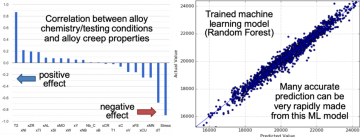
Achievement
Success stories of AI and machine learning have been motivating scientists who study physics, chemistry, materials, medicine, and many other subjects, to explore a new pathway of utilizing machine learning techniques like regression and classification for their scientific activities. However, most existing machine learning tools, systems, and methodologies have been developed for programming experts but not for scientists who have no or little knowledge of programming. A multidisciplinary team of researchers from Oak Ridge National Laboratory (ORNL) developed an advanced toolkit named ASCENDS to assist scientists or any persons who want to use their data for machine learning. ASCENDS provides a set of simple but powerful CLI (Command Line Interface) and GUI (Graphic User Interface) tools for non-data scientists to be able to intuitively perform advanced data analysis and machine learning techniques. The code can run on any personal computers, as well as modern supercomputers, such as ORNL’s Summit. The team launched the software as an open-source project[1] and published two journal papers in Journal of Open Source Software and Calphad.
Significance and Impact
Many scientists in various domains (e.g., physics, material science, mechanical engineering) at ORNL and outside of ORNL used the software for their research and published their work in various journals including:
- Do, Changwoo, Wei-Ren Chen, Sangkeun Lee, “Small Angle Scattering Data Analysis Assisted by Machine Learning Methods”, MRS Advances (Feb 2020), 1-8. https://doi.org/10.1557/adv.2020.130
- Wang, Jiaqi, Ali Yousefzadi Nobakht, James Dean Blanks, Dongwon Shin, Sangkeun Lee, Amit Shyam, Hassan Rezayat, and Seungha Shin. “Machine Learning for Thermal Transport Analysis of Aluminum Alloys with Precipitate Morphology.” Advanced Theory and Simulations 2, no. 4 (April 30, 2019): 1800196. https://doi.org/10.1002/adts.201800196.
- Shin, Dongwon, Yukinori Yamamoto, M.P. Brady, Sangkeun Lee, and J.A. Haynes. “Modern Data Analytics Approach to Predict Creep of High-Temperature Alloys.” Acta Materialia 168 (April 2019): 321–30. https://doi.org/10.1016/j.actamat.2019.02.017.
- Lee, Seulbi, Jian Peng, Dongwon Shin, and Yoon Suk Choi. “Data Analytics Approach for Melt-Pool Geometries in Metal Additive Manufacturing.” Science and Technology of Advanced Materials 20, no. 1 (December 31, 2019): 972–78. https://doi.org/10.1080/14686996.2019.1671140.
- Shin, Dongwon, Sangkeun Lee, Amit Shyam, and J. Allen Haynes. “Petascale Supercomputing to Accelerate the Design of High-Temperature Alloys.” Science and Technology of Advanced Materials 18, no. 1 (December 31, 2017): 828–38. https://doi.org/10.1080/14686996.2017.1371559.
- Shin, Dongwon, Amit Shyam, Sangkeun Lee, Yukinori Yamamoto, and J. Allen Haynes. “Solute Segregation at the Al/Θ′-Al2Cu Interface in Al-Cu Alloys.” Acta Materialia 141 (December 2017): 327–40. https://doi.org/10.1016/j.actamat.2017.09.020.
It is expected that the number of users and research outcomes will grow over time.
Research Details
- ASCENDS supports various classification/regression techniques (Linear regression, logistic regression, random forest, support vector machine, neural network, etc.)
- ASCENDS supports feature selection based on various correlation metrics
- ASCENDS is built on top of open source projects (Keras, TensorFlow, scikit-learn, etc.)
- Although ASCENDS has been originally developed for the VTO Propulsion Materials Program to support material scientists' research on high-temperature alloy design, the tool can be also used for many other applications.
Citation and DOI
- S. Lee, J. Peng, A. William, D. Shin, ASCENDS: Advanced data science toolkit for non-data scientists, Journal of Open Source Software, 5 (2020) 1656. https://doi.org/10.21105/joss.01656
- J. Peng, S. Lee, A. William, J.A. Haynes, D. Shin, Advanced data science toolkit for non-data scientists – A user guide, CALPHAD, 68 (2020) 101733. https://doi.org/10.1016/j.calphad.2019.101733
Overview
The VTO Propulsion Materials Program at ORNL has developed a powerful and versatile data analytics front-end tool for non-data scientists within the VTO project entitled “Machine Learning and Supercomputing to Predict Corrosion/Oxidation of High-Performance Valve Alloys.” The code greatly facilitates the analysis of alloy data, trains surrogate models, identifies correlations, and makes predictions to assist with the design of future experiments/simulations. Currently, available data analytics tools require a certain level of programming skill, which hampers the broader application of this emerging technique. ORNL developed the easy-to-use ASCENDS toolkit, which can help to analyze the datasets of many different disciplines, e.g., materials, physics, chemistry, and bioscience, to generate hypotheses and to develop AI/machine learning models for rapid/accurate prediction.
Last Updated: January 14, 2021 - 8:55 pm